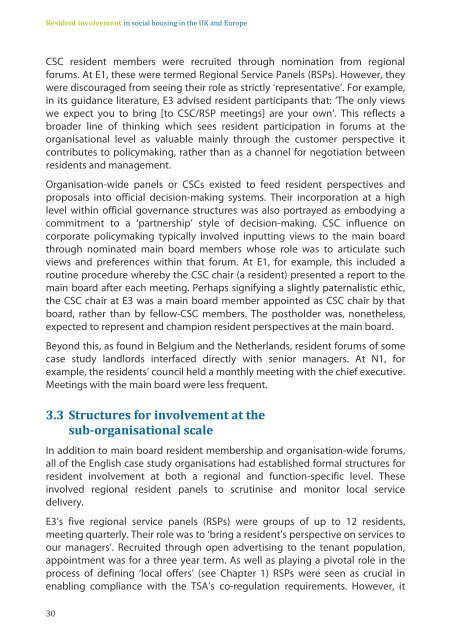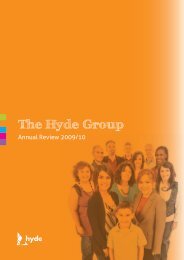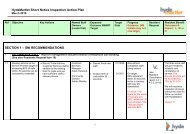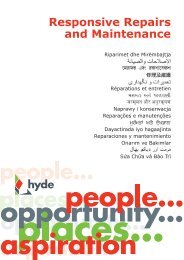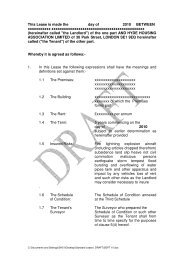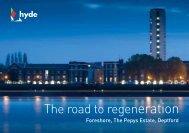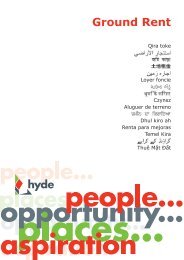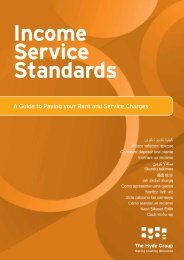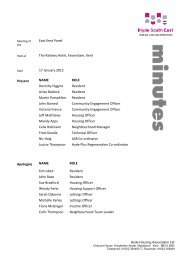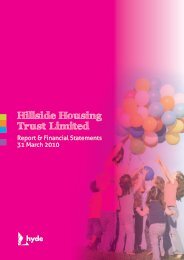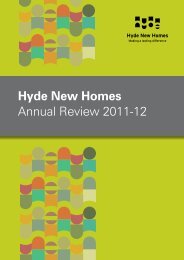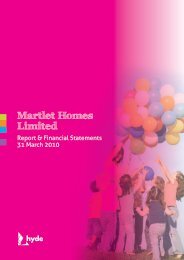Resident involvement - Hyde Housing Association
Resident involvement - Hyde Housing Association
Resident involvement - Hyde Housing Association
Create successful ePaper yourself
Turn your PDF publications into a flip-book with our unique Google optimized e-Paper software.
<strong>Resident</strong> <strong>involvement</strong> in social housing in the UK and Europe<br />
CSC resident members were recruited through nomination from regional<br />
forums. At E1, these were termed Regional Service Panels (RSPs). However, they<br />
were discouraged from seeing their role as strictly ‘representative’. For example,<br />
in its guidance literature, E3 advised resident participants that: ‘The only views<br />
we expect you to bring [to CSC/RSP meetings] are your own’. This reflects a<br />
broader line of thinking which sees resident participation in forums at the<br />
organisational level as valuable mainly through the customer perspective it<br />
contributes to policymaking, rather than as a channel for negotiation between<br />
residents and management.<br />
Organisation-wide panels or CSCs existed to feed resident perspectives and<br />
proposals into official decision-making systems. Their incorporation at a high<br />
level within official governance structures was also portrayed as embodying a<br />
commitment to a ‘partnership’ style of decision-making. CSC influence on<br />
corporate policymaking typically involved inputting views to the main board<br />
through nominated main board members whose role was to articulate such<br />
views and preferences within that forum. At E1, for example, this included a<br />
routine procedure whereby the CSC chair (a resident) presented a report to the<br />
main board after each meeting. Perhaps signifying a slightly paternalistic ethic,<br />
the CSC chair at E3 was a main board member appointed as CSC chair by that<br />
board, rather than by fellow-CSC members. The postholder was, nonetheless,<br />
expected to represent and champion resident perspectives at the main board.<br />
Beyond this, as found in Belgium and the Netherlands, resident forums of some<br />
case study landlords interfaced directly with senior managers. At N1, for<br />
example, the residents’ council held a monthly meeting with the chief executive.<br />
Meetings with the main board were less frequent.<br />
3.3 Structures for <strong>involvement</strong> at the<br />
sub-organisational scale<br />
In addition to main board resident membership and organisation-wide forums,<br />
all of the English case study organisations had established formal structures for<br />
resident <strong>involvement</strong> at both a regional and function-specific level. These<br />
involved regional resident panels to scrutinise and monitor local service<br />
delivery.<br />
E3’s five regional service panels (RSPs) were groups of up to 12 residents,<br />
meeting quarterly. Their role was to ‘bring a resident’s perspective on services to<br />
our managers’. Recruited through open advertising to the tenant population,<br />
appointment was for a three year term. As well as playing a pivotal role in the<br />
process of defining ‘local offers’ (see Chapter 1) RSPs were seen as crucial in<br />
enabling compliance with the TSA’s co-regulation requirements. However, it<br />
30


